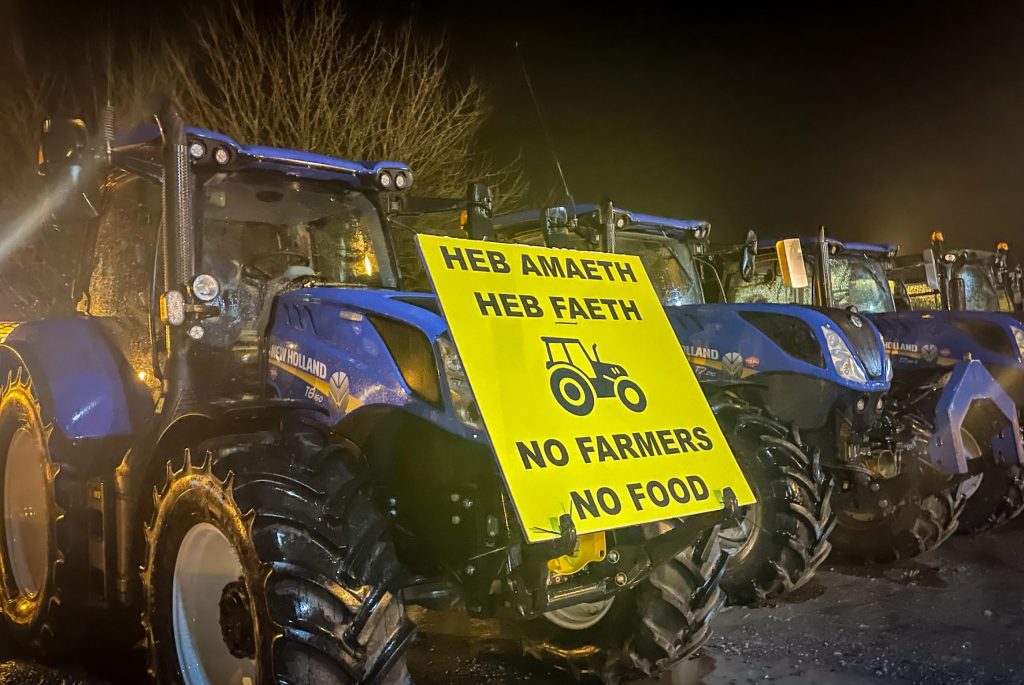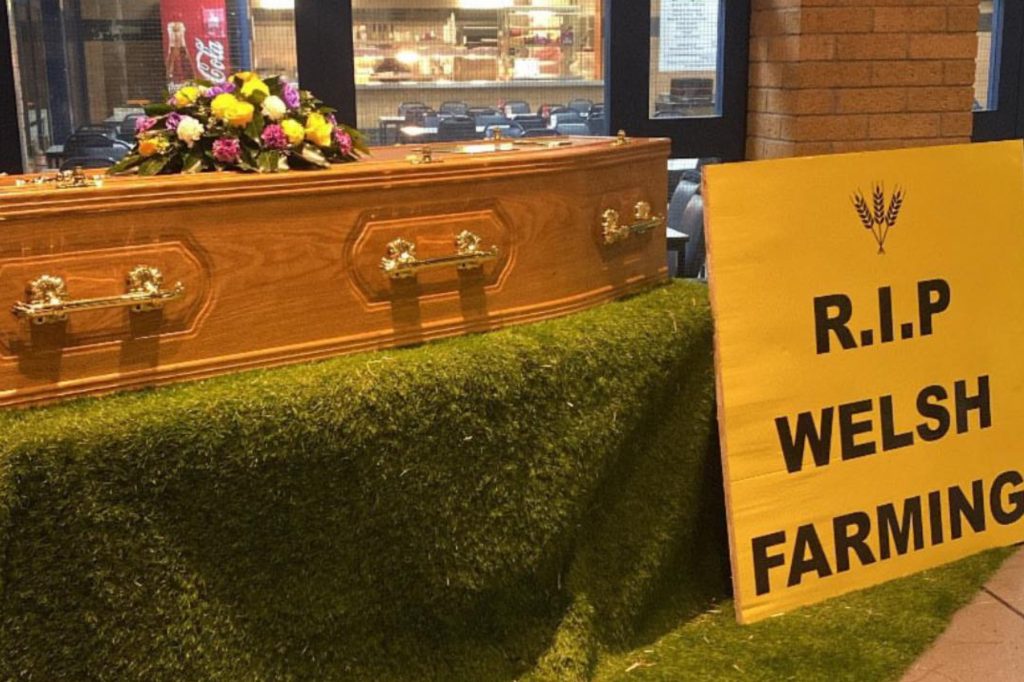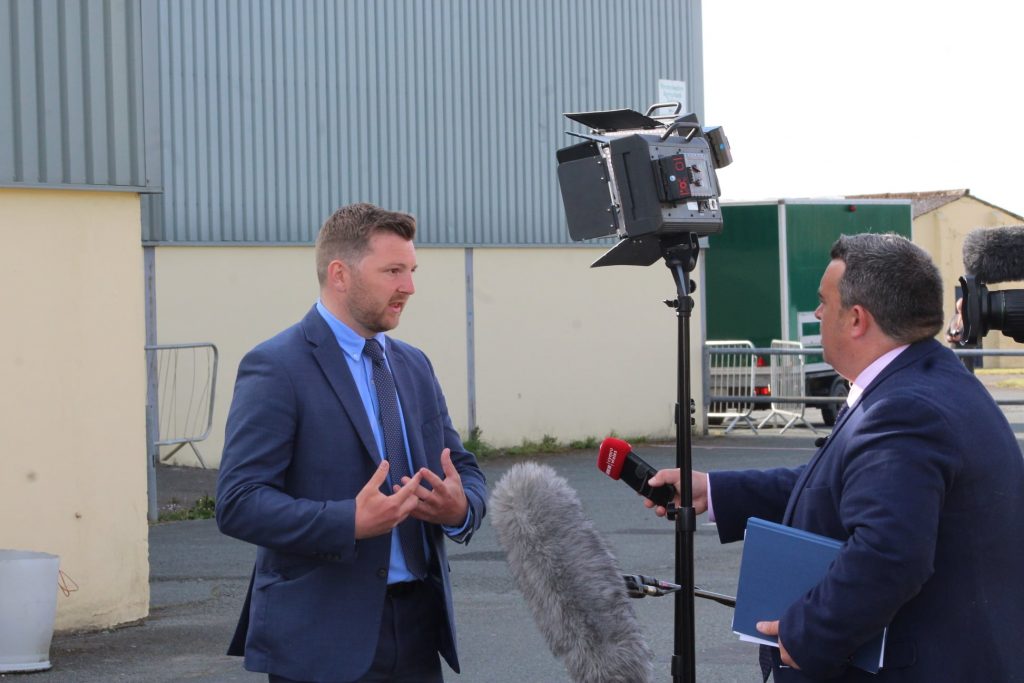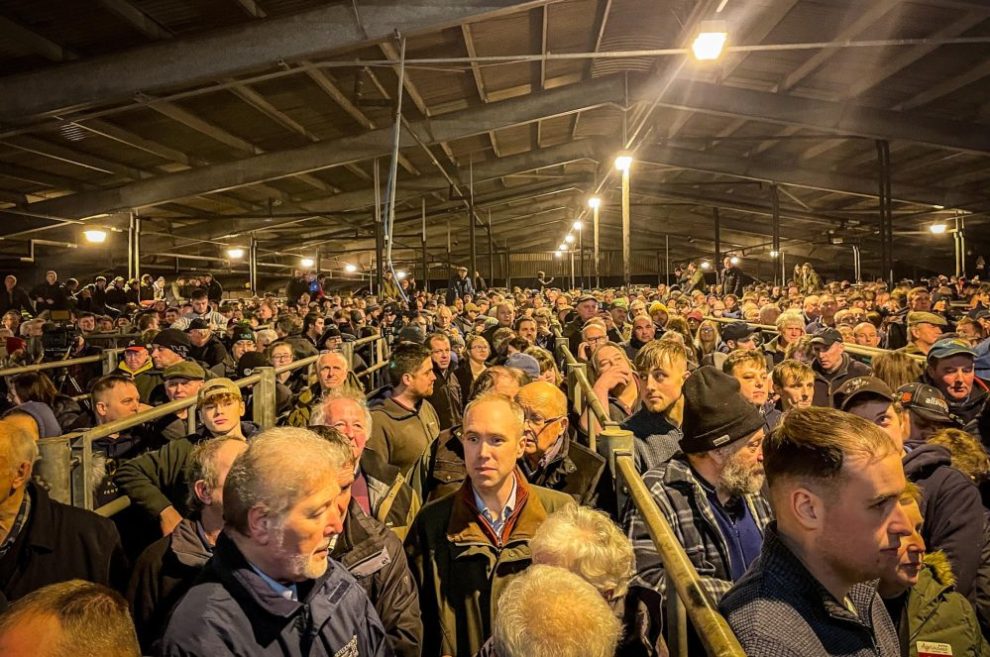WHILE scenes of agricultural protest sweep across Europe, from the bustling streets of Brussels to the historic avenues of Berlin, Britain’s farmland remains notably calm. Yet, farmers have been gathering in large numbers, voicing their concerns in packing out cattle markets rather than taking their issues directly to the streets.
The relative quiet of the farmers in Wales might seem puzzling against the backdrop of widespread European demonstrations. The agriculture sector across the whole of the UK, in fact, is grappling with significant challenges.
Recent surveys revealing alarming concerns among fruit, vegetable, and dairy producers about their survival in the coming years.
Nearly half of the UK’s fruit and veg growers and a third of dairy farmers fear their operations may not last beyond 2025, a statistic that paints a grim picture of the industry’s future.
One might speculate that Brexit has shielded British farmers from the tumult affecting their European counterparts.

However, this assumption quickly falls apart when one delves into the myriad issues facing UK agriculture.
The crisis is not of isolation but of scale, economics, and policy. British farms are generally larger than those in the EU, which may buffer them against some pressures but does not immunize them against the high costs of fuel, stringent environmental regulations, and the uncertainties post-Brexit policy changes bring.
In Wales, the situation is particularly acute. The Welsh government’s Sustainable Farming Scheme, set to redefine agricultural funding post-Brexit, demands significant environmental commitments from farmers.
They are required to dedicate portions of their land to tree planting and wildlife habitats, a mandate that many argue is impractical without undermining their business viability.
Coupled with the reduction in environmental payment schemes and sweeping regulations on slurry and fertiliser usage under the new nitrate vulnerable zones (NVZ) policy, Welsh farmers find themselves at a crossroads.
The dissatisfaction runs deeper, touching on the essence of farming identity and its place in society. British farmers, particularly in Wales, express a profound concern over their perception by the public and the political establishment. There is a fear of far-right or populist groups exploiting their cause, a worry compounded by a perceived lack of public empathy towards the agricultural sector. This cultural and political disconnect has left many feeling isolated and misunderstood, reluctant to adopt the protest tactics seen elsewhere in Europe.
Moreover, the shadow of bovine tuberculosis (TB) looms large, with Welsh farmers calling for more decisive action to tackle the disease that has led to significant cattle losses. The government’s refusal to consider a badger cull, seen by many as a necessary measure, has added to the sense of frustration and helplessness within the farming community.
The challenges are manifold: rising operational costs, from fertilisers to machinery fuels, have squeezed margins to breaking points, while environmental and regulatory demands place additional burdens on an already struggling sector. Yet, despite these hurdles, the response from Welsh farmers and their British counterparts has been markedly different from the uproar seen across the Channel.

This divergence perhaps speaks to a broader narrative about the British agricultural ethos – one of quiet endurance and a focus on adaptation over confrontation. The farming community in the UK, and particularly in Wales, is at a pivotal moment, navigating the complexities of modern agriculture, environmental stewardship, and economic survival.
In response to the crisis, Welsh Government Minister for Rural Affairs, Lesley Griffiths MS, has invited the presidents of the two farming unions to an urgent meeting to hear their views and discuss the serious concerns of Welsh farmers and rural businesses.
The meeting has been arranged following an urgent request from NFU Cymru President Aled Jones who met with Minister Griffiths earlier this week to express the deep sense of feeling and anguish that the industry is feeling at this moment in time.
NFU Cymru President, Aled Jones said: “We met with the Rural Affairs Minister Lesley Griffiths on Tuesday this week to express the deep concerns of the industry and we left her in no doubt over the strength of feeling and seriousness of the situation following the robust feedback we have received from our series of roadshows. I welcome the fact that the Minister recognises the serious concerns of farmers and as such has agreed to meet and look at ways to address these issues.
“Having travelled the length and breadth of Wales in the past week and met with thousands of members, it is clear that the current Sustainable Farming Scheme (SFS) consultation and the proposals laid out in it are causing a deep sense of anguish and concern as members contemplate the future scheme and the implications on their own individual business.
“The Minister has assured me this remains a genuine consultation and so I would urge anyone with an interest in Welsh farming to respond and let the Government know directly the strength of feeling that exists amongst our farming community. The information, briefings and response template are all available on the NFU Cymru website.
“The current consultation which proposes that the Basic Payment Scheme will be fully phased out in 2029 with no long-term stability payment in its place within the SFS is set against the backdrop of a challenging time for Welsh farmers. Agricultural inputs are over a third higher than pre-covid times, water quality regulations have added a huge regulatory and cost burden on farming businesses and bovine TB continues to cause heartache to farming families.
“NFU Cymru will take the concerns of the industry directly to the Minister at our meeting, and we will clearly set out our key asks.”

The conservatives, in opposition in Wales, have been vocal about what they feel is Welsh Labour’s lack of support for the farming industry.
Responding to news that protest action amongst farmers may soon be “inevitable”, Samuel Kurtz MS, Shadow Rural Affairs Minister, said: “The Labour Government must listen to the farming industry before it is too late.
“Welsh farmers have had to deal with a host of policy changes in a short space of time, their frustration is not being heard by the Labour Government and they are left feeling protests are the only option.
“There is a real sense of frustration and anger in the sector at the moment, therefore I am urging the Welsh Government to pause this consultation and to redouble their efforts to get the scheme right so that it works for Wales’ farmers.”
He later added: “Had the Welsh Government taken seriously my calls to pause the SFS consultation, then changes to the proposal could have been made. Sadly, my calls, like the calls from the farmers themselves were ignored.
“The inevitably of farmers protesting is linked to the Welsh Government’s inability to listen.
“I will stand shoulder to shoulder with farmers during any protest. My message to them is only stick together, be respectful, but the Welsh Conservatives will be with you.”
Cefin Campbell, Plaid Cymru Member of the Senedd for Mid & West Wales, who spoke at the large farmers’ meeting on Thursday (Feb 8), said: “Enough is enough was the resounding message amidst the 3,000 heavy crowd in Carmarthen.
“The frustration our farmers and rural communities feel towards the Welsh Government and Westminster on many issues was all too clear. I will do my best to make sure their voice is heard in Cardiff Bay, and I would urge the Welsh Government to accept the unanimous call made by those present for a meeting, where these concerns can be discussed further”.


















